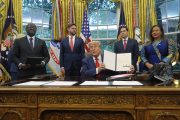
Two counties in Illinois, along with a portion of a third county, will vote this November to consider a nonbinding referendum to split the state in two — essentially making the City of Chicago its own entity while the rest of the state follows a different path.
Brown County in western Illinois and Hardin County in southern Illinois, along with the northeast portion of Madison County in the southwest part of the state, will vote to consider joining 24 other counties who have already voted in the last five years to study the possibility of the rest of the state breaking away from Cook County and the Chicago area to form their own state.
Or, put another way, the counties would like to kick out the Chicago area, which dominates state politics.
The referendum reportedly will read: “Shall the board of your county correspond with the boards of the other counties of Illinois outside of Cook County about the possibility of separating from Cook County to form a new state, and to seek admission to the Union as such, subject to the approval of the people?”
In 2019, two GOP state representatives, C. D. Davidsmeyer and Brad Halbrook, forwarded a bill that would have sought U.S. congressional approval to allow the non-Chicago portion of Illinois to become its own state. The bill didn’t make it out of committee.
“The reason I signed on to the bill is because Chicago policy continues to destroy the down state economy,” said Davidsmeyer, who was fighting a state measure to make the state’s minimum wage $15 per hour at the time.
“While it may be standard for a large city like Chicago, New York, or L.A., it’s not the standard for rural Indiana which is who we are competing against. My reason for signing on is that there are two different Illinois in the state. We have to have policies that allow both to compete nationwide.”
The desire for Illinois counties outside of metropolitan Chicago to break away from Windy City-dominated politics is not new. Going back to 1840, when a group of northern Illinois counties asked to be relocated to what was then the Wisconsin territory, some counties have longed to distance themselves from the goings on in Chicago.
In the 1970s, fourteen counties in west-central Illinois began referring to themselves as the Republic of Forgottonia as a way to protest how their needs and wishes were largely forgotten by the state legislators in Springfield.
In 1981, State Senator Howard Carroll, a Democrat from Chicago, introduced legislation to ask the U.S. Congress to consider Cook County as the 51st state. Carroll was vexed that other counties were balking at paying for the mass transit systems in Chicago. Senate Joint Resolution Number 48 passed the Senate by a voice vote, but was later tabled by the state’s House of Representatives.
Downstate legislators as recently as 2011 asked that the rest of the state be separated from the Chicago area after Pat Quinn was elected as governor despite carrying only three counties outside the Chicago area.
Downstate citizens don’t feel heard in a state government completely dominated by far-left Chicago.
“It’s really important to note that this has nothing to do with Democrat or Republican,” said G. H. Merritt of the secession group New Illinois. “It has to do with urban, rural and suburban. The economies and cultures and needs and interests of non-urban areas are different from those of a big city like Chicago. The problem is, in our state government we have a one-size-fits-all approach and things are foisted on the other parts of the state.”
The Illinois movement to break away from liberal stronghold Chicago echoes other movements such as the Greater Idaho movement, which looks to move several Oregon counties to Idaho, a state they believe lines up with their more-conservative values.
Similar movements have arisen in Maryland, where three rural counties seek to join West Virginia, and in California, where San Bernardino County is considering becoming its own state.
While these movements don’t have what most would consider to be a reasonable shot of succeeding, they are a gauge of how fed up many in rural America are feeling regarding their representation. People in rural America feel they are ignored by state and federal government — and they’re right.





